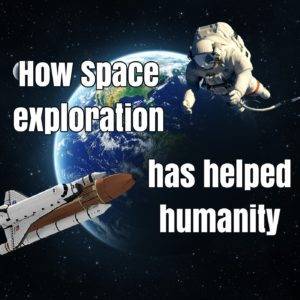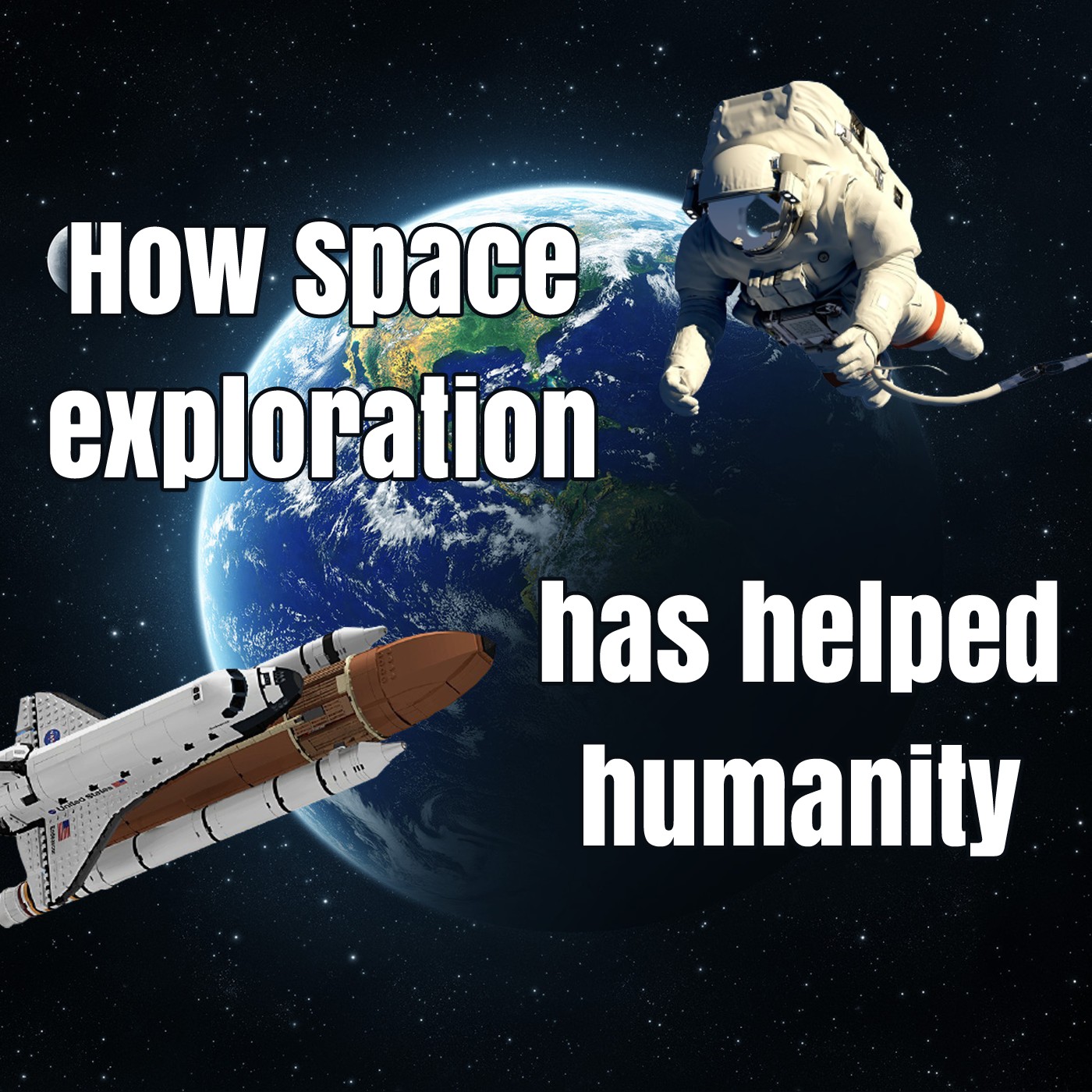How space exploration has benefited humanity

From GPS to the iPhone, life saving medical devices, and even predicting the weather, space exploration has helped humanity in more ways than meet the eye. In this episode I discuss the several industries in which sending rockets into orbit and astronauts onto a space station has helped humans throughout the past half century. If you enjoyed this episode please subscribe and share this podcast, and if you’d like to show your support please visit: Patreon.com/straponyourboots
You can listen to the podcast episode here:
Or you can watch the video here:
Here’s the transcript from this podcast episode, please excuse any typos!
Today I’m asking the question, what has space exploration done for humans, a lot of people I know have been talking to me about how SpaceX has been launching tons of rockets into space. And unleashing a vast amount of satellites as well, to create this new internet. And as we all know since the Cold War, when you know Russia and America are really battling it out to have the space race, to get people onto the moon to get people into space. We launched so many rockets and satellites and space shuttles and spaceships and space stations. And the question always remained to humankind is, why are we spending billions and probably even trillions at this point of dollars to go into space, like how is that benefiting us here on earth because here we are on earth with a million problems we have hunger and and natural disasters and war and diseases, and we’re spending all this money in outer space. So, how is it helping us? And there is a whole list of reasons, how space exploration started out as a race to the moon and ended up with a ton of technological advances here on Earth, that we use today.
One of the biggest things that I’ve noticed throughout the years. In terms of satellites, is that they’ve probably saved 1000s of lives every year, because they’re able to predict weather patterns, they’re able to see potential disasters that might happen like public storm warnings, and you know one of the things that I noticed in terms of, of the satellite imagery, is it also monitors greenhouse gases, as well as climate indicators. So, if we hadn’t had satellites to see all of these climate statistics and climate visuals, then we’d be left in the dark. So, I believe, you know, satellite weather predictions have completely transformed a critical element in our daily lives, which impacts every single type of industry out there something else, tied to climate would be, you know, forests, and rivers and glaciers and all sorts of other natural areas on Earth, using people in the space station who are monitoring it but as well as satellite imagery we’re able to see how the planet is being impacted by all of these changes and where we have to make critical decisions on where we have to start saving parts of the world and we’re able to see this because we’re in space and we can see it on a global view as someone said before, we’re trying to get people out of the trees, and to see the whole forest, and in this case we’re getting people off of their lands to see the whole globe as a big.
You know, one large ecosystem versus small little areas. This also helps monitor illegal activities or harmful activities you know animal poaching fires logging which is illegal in a lot of places. And of course, mining people that are mining in places that they shouldn’t be. So with satellite imagery and looking from a global perspective we can see a lot of these things. I mean, one of my favorite parts of space exploration and where it took us to is it got us to communicate. I mean, we were able to now do video chats and, you know, watching this video through the internet and being able to use TV and radio signals and this is how we were first able to start showing live television signals using satellites and very powerful. You know signals and how are we able to do this through the technology that we gained from space exploration banking systems use it so everybody’s, you know doing stock market and sending money and it’s all using very powerful computers and signals and satellites that we wouldn’t have if it wasn’t for space, which also comes into play with GPS, the Global Positioning System. I mean, everybody takes it for granted when we use Google Maps or MapQuest back in the day when we’re using GPS to help us navigate on the roads, but where do we get GPS? There are satellites, and we got them from space exploration because, you know, when people when people were trying to travel to space or astronauts were going to space, they needed some sort of very specific coordinates in order to navigate properly and so they had to build something to navigate our astronauts either into space we’re back down to earth from space. This also helps us communicate with our astronauts, of course, and they say Houston, I have a problem, well they’re doing that through signals and satellites.
So, you know, it’s very important to realize that we wouldn’t have GPS, we wouldn’t have satellites in space exploration. Now besides the technology that came from this there’s also an education piece stem right science technology engineering and math, these disciplines have been starting to increasingly be taught in schools all across the country in the world. And a lot of these, what I what they’re called disciplines or methodologies, or course curriculums. They came from space exploration once again because we needed more people to be able to do these very technical positions and jobs in the different industries that we have. And so by teaching kids at a young age, how to do these engineering things and how to calculate really complex formulas and whatnot. We are fostering a new era of the next revolution of space exploration, which obviously we’re trying to get to Mars we’re trying to populate a new planet because we’re ruining Earth right climate changes is killing our planet, the people on the planet Earth are not taking care of it. And there might be a day when we just can’t live on earth anymore. If you happen to catch the new George Clooney movie on Netflix in the midnight sky you’ll see Earth no longer has any air to breathe so they had to send explorers to other planets. Well, we need people, smart enough to not only be able to get us to other planets, but be able to thrive and start a civilization on those planets and that’s going to require stem basically so space exploration kind of fostered this new growth of innovation and technology and engineering and and science and math and that’s where it came from really something else that we take for granted in everyday life that we all use are roughly 2000 or more technologies that were specifically developed for use in space, like cordless power tools right I use a cordless drill almost every day.
When I’m fixing something and that’s what that was to use in space when you’re doing a spacewalk and you’re fixing a panel or something. But we aren’t here on earth because of that. And this especially is for hospital appliances such as the dialysis machines and heart rate monitors and you know when you’re in space, your body adapts to the different gravity. And so they had to develop new devices for astronauts for medical uses, and we took that technology and we implemented it in hospitals on Earth. So our hospital system and our health care system vastly improved because of space exploration. And then of course there’s things like freeze dried food, you know, and being able to package food to ship around the world, a lot easier for underserved and underprivileged countries. And we improve things like firefighters suits to repel flames and things like that so if you do some research you’ll see there’s so many different things that we use here on Earth every day that came about because of space exploration. Now I’m sure we can all agree. The most important thing that came from space exploration, was a geopolitical collaboration. Right now, internationally. International Space Station, for example, is a collaboration between America and Russia and China and India, a lot of other countries, and we are now working together on certain aspects of space exploration. Now we may not see eye to eye on earth, and we may always be, you know, fighting and with wars and battles and terrorism and whatnot, but in space. It’s a collaboration. And, at least in my opinion, it’s what’s the right step in the right direction right.
If we can collaborate in space. And if we can collaborate as we explore space and if we can possibly, you know, collaborate, once we get to Mars where another exoplanet. Maybe then we can start a new era in civilization, you know, getting along. I mean, you never know, right, maybe this is how it starts, but it definitely has caused us to think more about, you know, working together instead of fighting. And to me that’s a huge positive, robotics, is also a big thesis, as you can see in videos or movies, TV whatnot, or even NASA videos you’ll see that they have had to make robotic arms and robots in general, smaller and smaller, because when you’re in space in a space station or space shuttle. You need to make sure everything is small, because you can’t spare the room right. I mean you need to be able to maximize everything so they’ve been able to miniaturize a lot of robotics, which again has helped us here on Earth. They’ve also developed a ton of new materials lightweight metal composites and whatnot, to help build these spacecraft and space stations and satellites to be very light, but very durable, which again has helped, for example cars to become more lightweight but more durable, you know, there’s titanium and a lot of other metals that have increased the, you know, durability of even airplanes, or other vehicles, but have allowed us to use less fuel and be able to do things at a lower cost.
And, you know, space exploration really goes across all industries, and if you really dig deep into each facet of medical and weather and government collaboration and devices, whether it’s medical or, entertainment, even iPhones, you know, people don’t realize, laptops, computers, and iPhones communication devices. Where do you think laptops came from, you know, they needed to have the astronauts communicate on computers in space, they couldn’t bring some big bulky desktop with a big monitor, they needed something portable, so they created smaller microchips smaller computer processors smaller motherboards smaller everything, all the components had to be, you know, become smaller to fit into a small form factor. So that astronauts could then communicate with Houston on these laptops that’s why when you look at videos of astronauts in space, they’re always on these laptops that are connected to a wall aren’t like a wall mount, kind of like this podcast arm. So think about that laptops came from astronauts from NASA from space exploration, so did iPhones because eventually we needed smaller and smaller communications devices that are using satellites that came from space. So if you really look further into what we use on a daily basis that we got from space exploration. It’s completely mind blowing. And I suggest that you do look into it because it’s interesting, not only to find out what we’ve done. Up until now, but where we’re headed in the future and how it’ll continue to impact human evolution. Hopefully you enjoyed this episode and it was out of this world for you.
![]()






